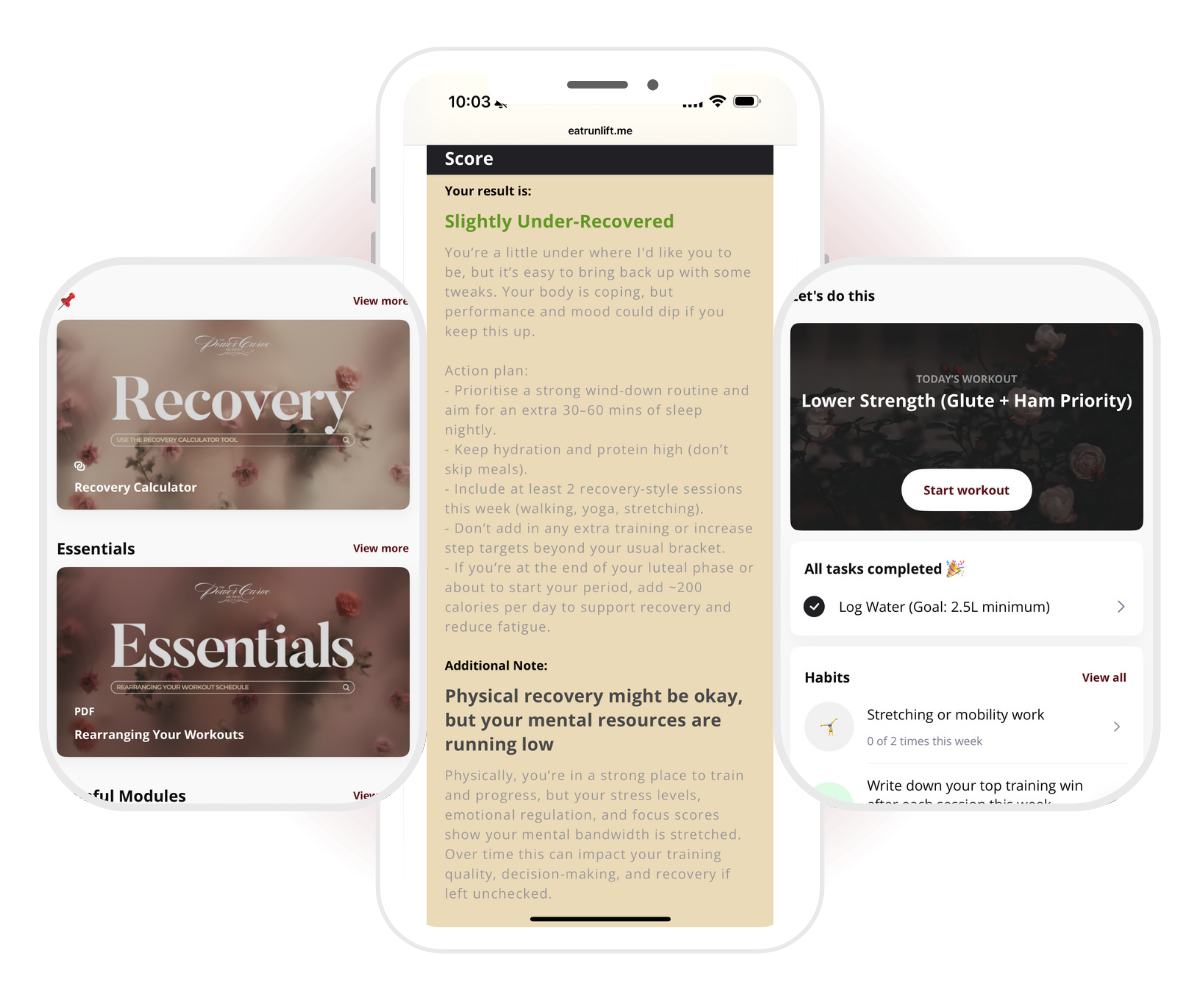Fat Loss for Busy High-Achievers: Why Just Training More Isn’t the Answer (and What is)
Fat Loss for Busy High-Achievers: Why Just Training More Isn’t the Answer (and What is)
I work with so many high-stress clients, from anxious overthinkers to burnt-out professionals and neurodivergent brains that never switch off. Different backgrounds, same pattern: constantly pushing harder.
Never feeling like they’re doing enough.
They miss a workout and immediately decide, “I’ll make up for it next week,” stacking on extra training, more cardio, more pressure. But the body doesn’t work like a math equation. Stress adds up, and if your recovery can’t keep up, your results stall.
Even small things can add invisible pressure, and I have a dumb example to prove it. I used to lie in bed at night saying, “You have to fall asleep.” Now I just tell myself, “You can keep your eyes open as long as you like.” It sounds silly, but that shift matters, because mental pressure is still pressure. And when your brain’s stressed, your body is too.
Let’s break down how that actually affects fat loss, and what you can do to turn things around.
1. Why stress matters for maintaining a leaner body composition
When you’re constantly stressed, your body acts like it’s under threat, because it thinks it actually is... The hormone cortisol, part of the stress system (HPA axis) rises to keep you alert and fuelled. Great in short bursts, but when it stays high or is constantly elevated:
Your body holds more fat, particularly around the belly.
You crave carbs and sweets more often as blood sugar drops after high cortisol
Sleep quality drops, which increases hunger hormones and fatigue.
Recovery slows down, so training feels harder for fewer results.
Basically, your body stops prioritising “aesthetic goals” and starts prioritising survival. That’s why high-stress clients often say in our first meeting, “I’m doing everything right, but nothing’s changing.”
2. The “push harder” trap
The classic high-achiever mistake: trying to outwork stress.
Missed a session? “I’ll double up.” Feeling puffy? “I’ll eat less.” Tired? “More caffeine.”
Here’s the truth.. when you’re already stressed (even if your mind can deal with it, your body can’t), adding more physical load just raises cortisol further. Instead of progressing, you’re feeling stuck and haven’t seen changes to your photos for months.
Muscle recovery slows, your nervous system stays switched on, and fat-loss signals get mixed up. Smarter training with good scheduling, not more training, is the answer. Especially for anxious, neurodivergent, or busy women whose brains are already running at 120%.
That’s exactly why I built The Power Curve Method, it’s about doing what actually works with your nervous system, hormones, and recovery capacity. Every training phase is structured to balance load and rest so you can build muscle, drop stress fat, and actually feel good while doing it.
And because recovery isn’t one-size-fits-all, I created the Recovery Calculator inside the app, a quick tool that helps you check if you’re under-recovering, overstressed, or perfectly balanced. It takes into account your sleep, fatigue, training volume, and menstrual cycle phase so you know whether to push, pull back, or take a deload week before your body forces one on you.
It’s for the high-achievers, the anxious brains, the neurodivergent women, and anyone who’s tired of running on adrenaline. It’s a system that finally aligns with how your body actually works, so help your body exhale while your results accelerate.
Get started here.
3. The mental stress you don’t notice
It’s not just deadlines or workload. Mental noise.. like worrying, overthinking, guilt-spirals, also triggers the same stress response!! Psychologists call it “perseverative cognition”, basically the brain looping on stress even when nothing’s happening. I see it a lot in late diagnosed neurodivergent women, they use this as their anchor for getting through their days.
If your inner voice says “I have to get this right” all day long, your cortisol barely gets a break. That constant mental strain disrupts sleep, digestion, and hunger regulation, leading to cravings or chaotic eating.
So much of stress management isn’t about just doing less, it’s about thinking differently. Learning to reduce the pressure you put on yourself is just as powerful as reducing your workload.
4. How stress messes with your eating
You probably don’t need me to tell you this one.. but here’s what’s actually happening biologically:
Skipping meals → overeating later: stress reduces appetite early in the day, then spikes hunger hormones later.
Craving “comfort foods”: high cortisol activates reward pathways, so you literally feel calmer after eating something high-fat or sugary.
Mindless snacking: when your brain’s overloaded, you default to autopilot eating.
Tired but wired: late-night scrolling, caffeine reliance, inconsistent sleep all raise evening cortisol and insulin levels.
If you find yourself raiding the fridge or pantry or mindlessly scrolling uber eats in the evening, take a look backwards into your day and ask what could be causing the stress.
5. Other ways high stress stalls fat loss
Poor sleep messes with hunger hormones and recovery.
Overtraining without enough rest raises inflammation.
Caffeine overload and dehydration both increase cortisol.
Inconsistent routines (skipping meals, variable bedtimes) confuse your circadian rhythm, another cortisol regulator.
Each one adds a little more friction to your progress!
6. How to lower cortisol naturally
The good news? You can absolutely fix this.. without fancy supplements or dropping your goals or your high standards!
Prioritise sleep and rhythm: Your cortisol should rise in the morning and fall at night. So: regular bed/wake times, darker room, less caffeine after lunch, no doom-scrolling in bed. Sleep is the ultimate fat-loss supplement.
Train smarter, not harder: Keep sessions challenging but recoverable. Add lighter days, walks, or yoga/“Flow with Zo” sessions (available inside Power Curve Method program) instead of cramming double workouts. You’ll progress faster by letting your body adapt properly.
Eat regularly and balanced: Protein + fibre + starch + fat at each meal. Don’t skip and then binge. Even spacing keeps blood sugar and cortisol stable.
Build micro stress-resets: Breathing exercises, journaling, short walks, quiet moments, whatever helps your body switch out of “fight or flight”. Neurodivergent clients often benefit from sensory grounding (music, weighted blanket, stretching). I personally like to lie on the floor with a heatpack on my chest or under my back ahhaha.
Watch your inner dialogue: Notice when you’re saying “I have to…” or “I should…”. Try “I get to…” or “I’m doing my best”. It sounds a little cheese but it helps lower that invisible daily stress.
Significant body composition change is about giving your body enough safety, rest, and stability to respond..
So next time you feel tempted to double your sessions or drop your calories, ask instead:
What’s my stress load right now?
If it’s high, recovery is actually your best fat-loss strategy.
When your nervous system calms down, your digestion improves, sleep deepens, training clicks, and fat loss finally happens without burning yourself out.
Hey there, I’m Rachel!
NUTRITIONIST, PERSONAL TRAINER, WELLNESS COACH
If you’re ready to ditch the all-or-nothing mindset and build a strong, confident body—you're in the right place.
✨ Start with my free 5-day Mini Mindset Reset to design a healthy lifestyle that actually fits your life.
🍑 Or join The Power Curve Method, my signature hourglass training program built to shape your glutes, waist, and mindset from the inside out.
While we make every effort to make sure the information in this website is accurate and informative, the information does not take the place of medical advice.



